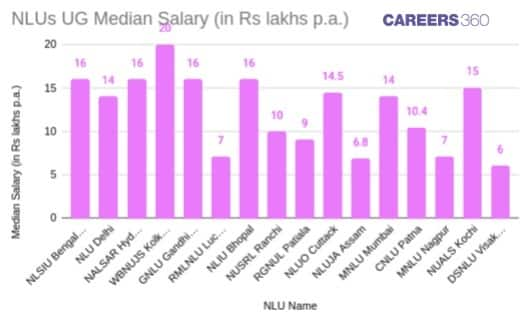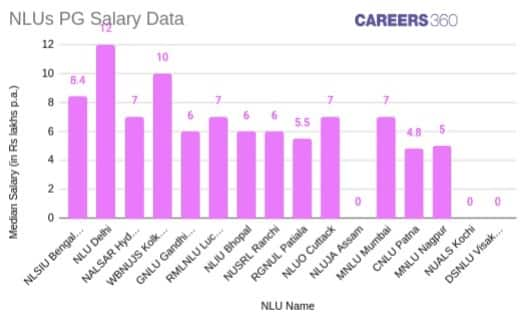Jindal Global Law School Admissions 2026
Ranked #1 Law School in India & South Asia by QS- World University Rankings | Merit cum means scholarships | Early Admissions (Pahse 2) Deadline: 28th Feb’26
The National Law Universities are often the go-to choices for law aspirants in India. One of the contributing factors towards a high preference for NLUs is the NLU placements season, which sees top legal firms in India recruiting young lawyers from the universities with attractive salary packages. The NLU placement reports are eagerly awaited every year. Like the trend seen in NLUs placement process earlier, this year too there has been a beeline of top companies for NLUs placements 2025. The law firms participating in NLUs 2025 placements include names such as Shardul Amarchand Mangaldas, Trilegal, Khaitan & Co. among others. In all, there are a total of 26 NLUs in India and majority of them make it to the NIRF law rankings 2025 which lists the top law college in India as per government data.
This Story also Contains

A total of 13 NLUs have been ranked in the NIRF law rankings 2025 which solidifies the universities' unique position in the field of legal education. However, this showcases a slight decline from the previous year count of 16. NLSIU Bengaluru and NLU Delhi are ranked in the top two and attract the highest NLU placement salary. Read on to get all the details about NLUs placement package including the placement process, median salary and more.
The NLUs have a placement cell that will manage the campus recruitment process. The placement cells are usually managed by the students themselves and carry out different activities such as preparation of the placement brochure, contacting companies and marking other arrangements.
Step 1: The companies are requested to conduct pre placement talks with the students where the recruiters showcase crucial information such as the organisation's profile, career opportunities at the firm, and salary package
Step 2: The recruiters then conduct a pre-interview screening process to shortlist candidates for the final interview process.
Step 3: Recruiters will then conduct a final interview after communicating about the same well in advance. The recruiters are also required to disclose the list of selected students and the salary package offered.
Zero Day Placement: This placement happens when students are in the fourth year of their 5 year programme. Since students are yet to complete their studies, the placement offers made during this time are also referred to as pre placement offers
Final Year Placement: This placement happens when students are in their final year. Students who couldn't participate in the Zero Day Placement are part of this placement process
Ranked #1 Law School in India & South Asia by QS- World University Rankings | Merit cum means scholarships | Early Admissions (Pahse 2) Deadline: 28th Feb’26
Among top 100 Universities Globally in the Times Higher Education (THE) Interdisciplinary Science Rankings 2026
The official NIRF rankings for law colleges 2025 have been released, and 13 NLUs find a place among the top 40 law colleges in the country. Among those, top-ranked NLUs have placements ranging from 16 LPA to 20 LPA.
Given below is the placement report of NLUs as per the latest available data for each NLU. The report contains details of the average package of NLU placement and number of students placed.
The data below for 5-year LLB programme, provides the details about the number of students passing out, number of students placed, their NLU placement salary, and the students who opted for higher education.

| Sl. No | NLU Name | Total no. of graduating students | No. of students placed | Median salary | Students selected for higher studies |
|---|---|---|---|---|---|
1 | NLSIU Bengaluru | 85 | 70 | Rs. 16 lakh p.a. | 2 |
2 | NLU Delhi | 79 | 65 | Rs. 18 lakh p.a. | 10 |
3 | NALSAR Hyderabad | 115 | 108 | Rs. 17.50 lakh p.a. | 7 |
4 | WBNUJS Kolkata | 127 | 122 | Rs. 20 lakh p.a. | 5 |
5 | GNLU Gandhinagar | 181 | 175 | Rs. 18.00 lakh p.a. | 6 |
6 | RMLNLU Lucknow | 171 | 158 | Rs. 7.00 lakh p.a. | 0 |
7 | NLIU Bhopal | 113 | 48 | Rs. 16 lakh p.a. | 60 |
8 | NUSRL Ranchi | 101 | 39 | Rs. 9.30 lakh p.a. | 12 |
10 | NLUO Cuttack | 158 | 77 | Rs. 14 lakh p.a. | 10 |
11 | NLUJA Assam | 58 | 18 | Rs. 8.90 lakh p.a. | 16 |
12 | CNLU Patna | 136 | 110 | Rs. 10.80 lakh p.a. | 26 |
13 | MNLU Nagpur | 110 | 85 | Rs. 7.64 lakh p.a. | 25 |
| Sl. No | NLU Name | Total no. of graduating students | No. of students placed | Median salary | Students selected for higher studies |
|---|---|---|---|---|---|
1 | NLSIU Bengaluru | 90 | 77 | Rs. 7 lakh p.a. | 1 |
2 | NLU Delhi | 72 | 48 | Rs. 10.68 lakh p.a. | 9 |
3 | NALSAR Hyderabad | 67 | 59 | Rs. 7.80 lakh p.a. | 8 |
4 | WBNUJS Kolkata | 100 | 75 | Rs. 10 lakh p.a. | 12 |
5 | GNLU Gandhinagar | 67 | 43 | Rs. 6.20 lakh p.a. | 24 |
6 | RMLNLU Lucknow | 27 | 0 | 0 | 0 |
7 | NLIU Bhopal | 55 | 19 | Rs. 7 lakh p.a. | 4 |
8 | NUSRL Ranchi | 40 | 12 | Rs. 6.50 lakh p.a. | 2 |
10 | NLUO Cuttack | 43 | 32 | Rs. 6 lakh p.a. | 7 |
11 | NLUJA Assam | 38 | 6 | Rs. 1.8 lakh p.a. | 12 |
12 | CNLU Patna | 66 | 51 | Rs. 7.20 lakh p.a. | 15 |
13 | MNLU Nagpur | 30 | 21 | Rs. 6 lakh p.a. | 9 |
| Sl. No | NLU Name | Total no. of graduating students | No. of students placed | Median salary | Students selected for higher studies |
|---|---|---|---|---|---|
1 | NLSIU Bengaluru | 74 | 56 | Rs 16 lakhs p.a. | 15 |
2 | NLU Delhi | 83 | 69 | Rs 14 lakhs p.a. | 10 |
3 | NALSAR Hyderabad | 112 | 98 | Rs 16 lakhs p.a. | 12 |
4 | WBNUJS Kolkata | 127 | 108 | Rs 20 lakhs p.a. | 19 |
5 | GNLU Gandhinagar | 175 | 163 | Rs 16 lakhs p.a. | 12 |
6 | RMLNLU Lucknow | 174 | 148 | Rs 7 lakhs p.a. | 26 |
7 | NLIU Bhopal | 120 | 45 | Rs 16 lakhs p.a. | 65 |
8 | NUSRL Ranchi | 116 | 26 | Rs 10 lakhs p.a. | 23 |
9 | RGNUL Patiala | 163 | 31 | Rs 9 lakhs p.a. | 8 |
10 | NLUO Cuttack | 177 | 87 | Rs 14.50 lakhs p.a. | 11 |
11 | NLUJA Assam | 70 | 16 | Rs 6.80 lakhs p.a. | 20 |
12 | MNLU Mumbai | 54 | 30 | Rs 14 lakhs p.a. | 6 |
13 | CNLU Patna | 137 | 105 | Rs 10.40 lakhs p.a | 16 |
14 | MNLU Nagpur | 105 | 81 | Rs 7 lakhs p.a. | 24 |
15 | NUALS Kochi | 67 | 30 | Rs 15 lakhs p.a. | 28 |
16 | DSNLU Visakhapatnam | 120 | 30 | Rs 6 lakhs p.a. | 20 |
The median salary, a figure representing the average NLU placement packages, ranges between Rs. 5 lakhs pa to 12 lakhs pa in NLUs that have placed students in different organisations. Given below is the NLU placement data for PG students as per latest available data.

The table given below gives NLU PG placements NIRF data. The data consists of LLM placements in NLUs and students who opted for higher studies.
Sl. no | NLU Name | Total no of graduating students | No. of students placed | Median Salary | Students selected for higher studies |
1 | NLSIU Bengaluru | 68 | 37 | Rs 8.40 lakhs p.a. | 12 |
2 | NLU Delhi | 75 | 50 | Rs 12 lakhs p.a. | 8 |
3 | NALSAR Hyderabad | 64 | 53 | Rs 7 lakhs p.a. | 7 |
4 | WBNUJS Kolkata | 100 | 72 | Rs 10 lakhs p.a. | 12 |
5 | GNLU Gandhinagar | 63 | 52 | Rs 6 lakhs p.a. | 11 |
6 | RMLNLU Lucknow | 27 | 25 | Rs 7 lakhs p.a. | 2 |
7 | NLIU Bhopal | 57 | 18 | Rs 6 lakhs p.a. | 35 |
8 | NUSRL Ranchi | 38 | 6 | Rs 6 lakhs p.a. | 1 |
9 | RGNUL Patiala | 55 | 50 | Rs 5.50 lakhs p.a. | 4 |
10 | NLUO Cuttack | 42 | 27 | Rs 7 lakhs p.a. | 6 |
11 | NLUJA Assam | 35 | 0 | 0 | 0 |
12 | MNLU Mumbai | 45 | 1 | Rs 7 lakhs p.a. | 1 |
13 | CNLU Patna | 61 | 43 | Rs 4.80 lakhs p.a. | 14 |
14 | MNLU Nagpur | 24 | 15 | Rs 5 lakhs | 9 |
15 | NUALS Kochi | 55 | 0 | 0 | 0 |
16 | DSNLU Visakhapatnam | 54 | 0 | 0 | 0 |
Top Companies For NLUs Placements
The NLUs are the top law schools in India and the recruitment process has seen some very big names coming to campus to recruit students. The top companies for all NLU placements include a mix of top law firms, banks and insurance companies. Given below is a list of top recruiters that regularly hire students from the NLUs
Top Recruiters | |
|---|---|
Khaitan & Co | Shardul Amarchand Mangaldas |
Luthra & Luthra | Trilegal |
Cyril Amarchand Mangaldas | Induslaw |
Axis Bank | Saraf & Partners |
ICICI Bank | S&R Associates |
National Stock Exchange | Tata AIG |
You may also check -
Frequently Asked Questions (FAQs)
As per the latest available data, the highest median salary is offered by WBNUJS Kolkata at Rs 20 lakhs p.a.
Yes, NLUs have a placement process. Though some students opt out of the process and go for higher studies.
The number of students placed depends on the number of students who are participating in the placement process. Going by the latest data the top NLUs such as Delhi, Hyderabad and Bengaluru are able to place almost 80% of the students.
No. Many students opt to go for higher studies and some choose to not be part of the NLU placement process.
On Question asked by student community
Since you have not specified your category, I will answer for all categories. A CLAT rank of 38169 (typically 40-45 marks) makes admission to top NLUs difficult. For General candidates, chances are nil. Even for OBC, SC, and ST categories, admission is primarily possible only through state domicile quotas or
After the CLAT results are declared, candidates participate in a centralised online counselling process managed by the Consortium of NLUs. Eligible candidates register on the official portal, submit their NLU preference list , and pay a counselling fee. Seat allotment happens across multiple rounds based on rank, category, and preferences,
Hi, you can apply for admissions in Nirma University, NFSU Ahemdabad, Alliance, IPU University and affiliated instiutes (in case you are reserved category candidates), UPES Dehradun, BITS Law School etc.
Start preparing for CLAT by first understanding the exam pattern and syllabus, which includes English, Current Affairs, Legal Reasoning, Logical Reasoning, and Quantitative Techniques. Make a simple daily routine and begin with basics read newspapers regularly for current affairs, practice comprehension passages for English and legal sections, and solve basic
Hello,
With a CLAT AIR of 33599 and SC category rank of 2103, and being a Delhi domicile, your chances at IP University (GGSIPU) are moderate to good, especially in later counselling rounds.
Based on previous year trends, some IPU-affiliated law colleges have closed at higher SC category ranks, so
Among top 100 Universities Globally in the Times Higher Education (THE) Interdisciplinary Science Rankings 2026
NAAC A+ Accredited | Among top 2% Universities Globally (QS World University Rankings 2026)
Excellent curriculum; an impressive range of electives, besides core law courses. Up to 100% merit scholarship on a first-come, first-served basis
Moot Court | Mock trials | Legal Aid Clinic
Admissions open for B.A. LL.B. (Hons.), B.B.A. LL.B. (Hons.) and LL.B Program (3 Years) | School of Law, MRU ranked No. 1 in Law Schools of Excellence in India by GHRDC (2023)
NAAC A++ Accredited | Ranked #11 by NIRF